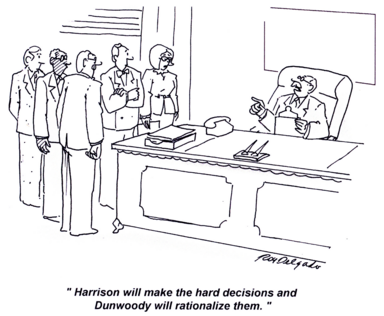CHRIS: I think we ought to do more to help the poor.
PAT: So do I!
CHRIS: How can that be? Just yesterday we were talking about a proposal to tax the 1% more heavily in order to fund poverty relief programs, and you said you opposed that plan.
PAT: I do oppose that plan. What does that have to do with anything?
CHRIS: Well, evidently you oppose at least one thing we can do to help the poor.
PAT: Well, hang on. You just said you thought we ought to do more to help the poor. Now you’re saying that you think someone else ought to do more to help the poor…
CHRIS: What I meant was that I think we as a society ought to do more to help the poor.
PAT: I see. I agree with that, too. Only, now I have question: Don’t you consider yourself a part of society?
CHRIS: I most certainly do.
PAT: I thought so, but then why, when talking about what we as a society ought to do for the poor, did you choose to single out a group to which you do not belong? Don’t you think you, personally ought to do more to help the poor?
CHRIS: I give what I can, but the wealthy could afford to give much more than I can give.
PAT: Yes, that is probably true. However, you said before that you thought we as a society ought to do more for the poor. Upon clarification, I now see that what you really meant was that you personally cannot afford to do more for the poor, but someone else can, and so you feel that they ought to. You began by talking about “us,” but what you really meant was “them.” Why did you say “we” when what you really meant was “they?”
CHRIS: We are all part of society, all of us. If we want to enjoy a society in which all of us has the opportunity to flourish, then we must all meet our ethical responsibilities. Because the wealthy are part of our society, I include them whenever I say “we.”
PAT: Chris, are you okay? I thought you were doing pretty well for yourself. You have a nice job and seem to be making a comfortable living. You even have some money left over to donate to charity. Are you not flourishing?
CHRIS: Wait, what? Of course I’m flourishing; I have a great life.
PAT: Well, doggone it. Now I’m really confused.
CHRIS: I didn’t think it was a very complicated concept. What seems to be perplexing you?
PAT: Well, before, you were saying that “we” ought to do more, but what you really meant was a group of “us” to which you don’t belong. But just now, you said you thought we all had to meet our ethical responsibilities in order for all the rest of us to enjoy the opportunity to flourish…
CHRIS: You don’t seem to be confused to me, Pat.
PAT: Well, hang on. When you say that we need to meet our ethical responsibilities, you obviously mean that the wealthy ought to do more to help the poor, right?
CHRIS: Right.
PAT: But “the wealthy” doesn’t mean you.
CHRIS: Right.
PAT: And since you say you have a great life, then that means “the poor” doesn’t mean you, either.
CHRIS: Well… right.
PAT: So then when you say that you want all of “us” to flourish, you mean that you want someone other than you to gain something contributed by someone else, other than you.
CHRIS: Yes, so?
PAT: So, you keep saying “us” and “we,” but in no case do you actually mean to refer to yourself. I know you and I have disagreed on politics in the past, but I never expected us to disagree so profoundly on the meaning of the words “we” and “us.”
CHRIS: Come, now, Pat. Don’t you think you’re being a little obtuse? I’m talking about making our society a better place. We all live here, rich, poor, and average. We should all accept some level of responsibility for the society in which we live, and we should all strive to provide the foundation of a better polity. That naturally means that some of us will be beneficiaries and some of us will be benefactors. Because I’m doing okay, I make a point of donating what I can, and I never make a point of accepting a donation I don’t need. But those who are doing much better than I am should give more, and those who are worse off than I should be given more. But we’re all part of the polity.
PAT: I agree with all of that. All I’m saying is that you’re not really talking about “society” or “the polity,” you’re talking about what should happen to people other than you. Even worse, you’re talking specifically about people who have different characteristics than you have. Some of them give more, some of them receive more, but none of them are you. Let me ask you another question: Would you say you belong to the same society as “the 1%?”
CHRIS: I see where you’re going with this. In one sense, I belong to the same society they do because we are all part of the same polity. But in another sense, we don’t exactly hang out in the same social circles, so I guess I don’t belong to their society per se.
PAT: Neither do you hang out with the poor, Chris.
CHRIS: That’s true, too. But we all belong to the same polity, meaning we are all subject to the same government and the same laws. So when I was talking about that progressive tax increase, I meant that this is a policy everyone within the same polity should support.
PAT: Well, I still disagree with you there, but I think you probably know now that my disagreement has nothing to do with “society.”
CHRIS: Of course it has nothing to do with society, Pat. It’s rational self-interest. You’re rich. You don’t want to pay more taxes.
PAT: Wait a minute. That means that when you first said “we,” what you really meant was… me?
CHRIS: So it would seem.
PAT: Why didn’t you just say so in the first place? You made it sound like you wanted to help. And remember, I initially agreed that you and I ought to do more. You never intended to do more for the poor.
CHRIS: I guess it doesn’t sound very nice when you put it that way. I only wanted to make an agreeable case for our helping the poor… er, I guess for your helping the poor. Look, I’m sorry for putting it to you in an offensive way. I really didn’t see it that way.
PAT: It was an honest mistake. We’re friends, apology accepted.
CHRIS: Well, now I feel a little awkward. Let’s talk about something else.
PAT: Okay, sure.
CHRIS: I think we ought to treat women more fairly…






